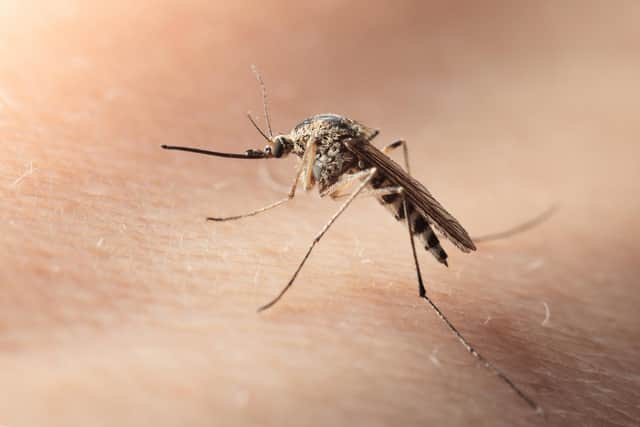All you need to know to avoid a surge in mosquito problems in Hucknall
and live on Freeview channel 276
The British Pest Control Association (BPCA), is urging householders and businesses in Hucknall to help curb the numbers of mosquitoes by taking a few preventative steps.
Some mosquito species will bite, which can cause a nuisance in the home or workplace, although many flying insects seen indoors are actually the harmless crane fly.
Advertisement
Hide AdAdvertisement
Hide AdDee Ward-Thompson, head of technical at BPCA, said: “In Britain, mosquitoes cause those familiar itchy bites with a red swelling around them.


“Mosquito eggs are laid in stagnant water and adults, on emerging, need to feed.
“Male mosquitoes feed on the nectar of flowering plants, but females have tubular piercing mouth-parts that allow them to feed on human or animal blood. Females also require a blood meal before they can lay eggs.
“Individual mosquitoes can be killed with a swat or aerosol fly spray, but if the problem persists, we recommend contacting a pest professional.”
Advertisement
Hide AdAdvertisement
Hide AdThe BPCA has three top tips to prevent problems with mosquitoes:
Watch out for water – regular clearing of guttering, water butts, bird baths and other items such as old tyres will get rid of stagnant water, deterring mosquitoes from laying their eggs
No-fly zone – screens will help prevent adult mosquitoes getting into the home, use 1.2mm diameter mesh for mosquitoes or 0.6mm for midges
Remember repellent – your local pharmacy will have insect repellent products that can help prevent bites and may also stop female mosquitoes getting the blood meal they need to breed
Advertisement
Hide AdAdvertisement
Hide AdThere are 30 native species of mosquito in Britain and BPCA has online guide which can be found here.
Dee added: “Most commonly seen indoors is Culex pipiens, which is often misidentified as a gnat.
"It doesn’t bite, but is almost indistinguishable from Culex molestus which does.
“Another species that is fairly common indoors is Anopheles maculipennis, a brownish species with small spots on its wings that bites readily, especially at dusk.
Advertisement
Hide AdAdvertisement
Hide Ad“If they are becoming a nuisance, we recommend seeking advice from a pest professional.
“They will investigate and take action on a case-by-case basis and have access to specialist equipment for dealing with mosquito issues.”